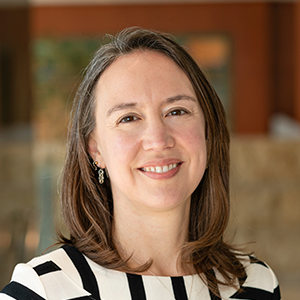The research community at the Institute includes visiting scholars, consultants, economists, research analysts, and research assistants. These scholars bring a diversity of backgrounds, interests, and expertise to research that deepens our understanding of economic opportunity and inclusion as well as policies that work to improve both.
Belinda Archibong did not grow up knowing she wanted to study economics. But she did confront at a young age the reality that characteristics over which we have no control can affect our economic outcomes, regardless of the amount of work we put in.
Archibong, a visiting scholar at the Institute, was born in Nigeria. Her mother was a lawyer and the family enjoyed a middle- class life. After immigrating to the United States, her mother’s foreign degree meant she could not initially practice law and instead worked low-wage jobs that meant the family struggled financially. At the same time, Archibong enjoyed the good fortune of having a mother who valued quality education for her children and was able to make it happen.
“That really crystallized my understanding of the role of arbitrariness of country of origin and gender and ethnicity and family, and how all this affects peoples’ economic outcomes,” Archibong explained. “I thought that was unfair. I remember being 12 and thinking, how does this happen?”
That question of “how” usually comes down to institutions that mediate access to education, the labor market, a healthy environment, and other components of economic opportunity. Much of Archibong’s research agenda centers on understanding how institutions affect the distribution of resources and how they can be reformed to improve access for everyone.
For instance, she has shown how the British colonial government in Nigeria exploited prisoners’ labor to build infrastructure that increased colonial revenue, a system that distorted incentives for incarceration and had long-lasting effects on Nigerians’ trust in legal institutions, including the police.
During her visit at the Institute, Archibong plans to study how to leverage online job postings to get around the social networks that traditionally play a big role in hiring—to the disadvantage of less-connected groups, including women and minorities. Data from the largest online job platform in Nigeria revealed that qualified female applicants do not apply to as many jobs or to as high-level of jobs as their male counterparts. A pilot study of a simple intervention informing women that they are qualified for a job increased the likelihood they applied. Archibong plans to continue experiments with both job applicants and hiring managers to find ways to achieve more equitable access to labor markets.
This article is featured in the Fall 2022 issue of For All, the magazine of the Opportunity & Inclusive Growth Institute
More scholar spotlights from this issue
Lisa Camner McKay is a senior writer with the Opportunity & Inclusive Growth Institute at the Minneapolis Fed. In this role, she creates content for diverse audiences in support of the Institute’s policy and research work.







